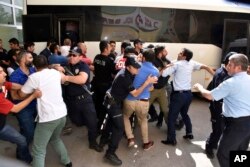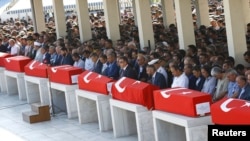The U.N. high commissioner for human rights has condemned the attempted military coup in Turkey but has raised concerns about the mass arrests and detention of thousands of people suspected of involvement in the failed military takeover.
U.N. rights chief Zeid Ra'ad Al Hussein said those responsible for the violence must be brought to justice, but that this must be done in accordance with the rule of law and by upholding human rights principles.
Turkish authorities have cracked down heavily on those suspected of involvement in the failed coup. Nearly 9,000 police officers and 6,000 military personnel have been dismissed. In addition, an estimated 3,000 judges have been suspended.
Zeid said he is deeply concerned about the mass suspension and reports of detention orders issued against many. His spokeswoman, Ravina Shamdasani, said the suspensions are particularly worrying, given concerns about judicial independence in Turkey.
“The high commissioner stresses that the independence of the judiciary and of the legal profession is key to the fair administration of justice, and judges must be able to exercise their functions without undue restrictions, pressures, threats or interference. The mass suspension or removal of judges is cause for serious alarm, and reports that many have been subject to detention orders also raises concerns of arbitrary detention,” she said.
Shamdasani told VOA the high commissioner’s office has been in touch with Turkish authorities and has requested that independent observers be allowed to access places of detention.
“There need to be independent observers — independent people visiting and ensuring that the conditions of detention are adequate, ensuring that there is access to lawyers, and that the detainees have access to their families. There need to be independent observers. Now whether these are U.N. or non-U.N. observers, it does not matter as much. What is important is that they are independent,” she said.
Nearly 300 people were killed during the failed coup. Turkish President Recep Tayyip Erdogan said he is ready to reinstate the death penalty if the people demand it. Turkey abolished capital punishment in 2004.
Zeid warned that reintroduction of the death penalty would be a breach of Turkey’s obligations under international law and a big step in the wrong direction.






